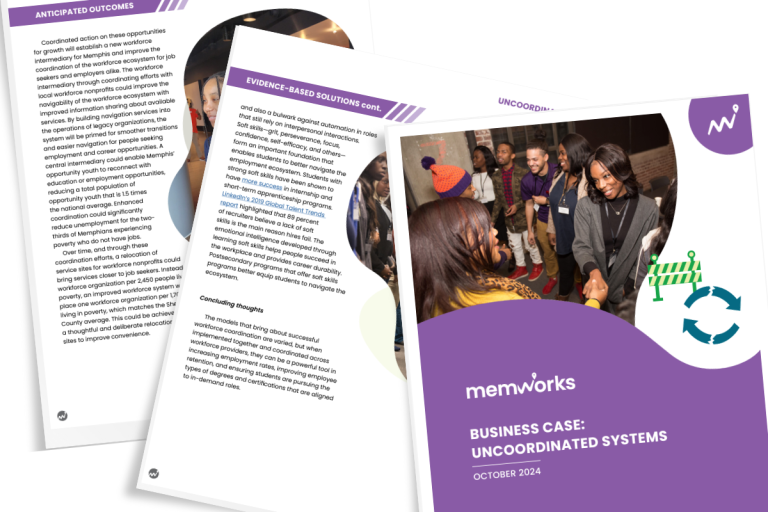MemWorks built a comprehensive understanding of the challenges faced by workforce participants living in poverty before developing evidence-based solutions to address them. Meeting with workforce participants, and the organizations that support them, to understand their experience pursuing postsecondary education and seeking living-wage career paths was a core focus of MemWorks. We conducted surveys, interviews, and focus groups with more than 100 postsecondary students, workforce participants, employers, and nonprofit staff who provide workforce services.
This blog post shares insights from these conversations about how the misalignment between the support technical training providers offer and the hiring practices of employers can impede recipients of industry credentials from realizing the employment outcomes they are qualified for.
Support for students in technical training programs
“I didn’t even know that we had counselors but I do think that that is something that we can work on, to better inform everybody.”
-Technical training student
Both training participants and training program staff members reported a lack of knowledge about supportive services available to participants. This often led students to perceive that there are limited opportunities for support, even when that is frequently not the case. The most common way students shared that they learned about available support was by word-of-mouth, with several students mentioning that their school’s website was hard to navigate and unhelpful trying to learn about and access available support services.
During one focus group with a training program, almost none of the students in the room knew about the same resources that were available. These students actually used the focus group to learn about the available resources from each other.
Employers not fully embracing skills-based hiring
“It’s like a lot of jobs that’ll say, ‘We want this amount of experience for this entry-level job.’ I was like, ‘This is the job I’m supposed to do to get the experience.’”
Technical training graduates with industry-relevant certifications shared their challenges trying to find jobs in their desired industry. Despite having an industry credential and the skills to perform the job, students shared that not having a four-year degree or prior industry experience was a common barrier raised by employers that limited these graduates’ access to entry-level jobs.
Trainees shared that at job fairs sponsored by the technical training institution, some employers required traditional college degrees on top of their certifications to be considered for entry-level roles. This surprised the trainees because the job fair was focused on graduates with certifications from that specific Information Technology training program. Requirements for a degree can prevent employers from hiring qualified talent. This challenge was shared by certification program graduates across several industries.
“The post-graduation process was kind of stressful…I didn’t end up getting a job in IT. And I applied to quite a few and I had some interviews here and there, but I didn’t get hired.”
– IT Training Alum
In addition to the challenges with obtaining a job, several workforce participants described an inability to progress in their career path without a college degree, regardless of years of experience, industry credentials, or practiced skills. Some workforce participants described having to make lateral career moves rather than upwards ones, while others discussed needing to switch jobs or career paths in order to increase their earnings.





